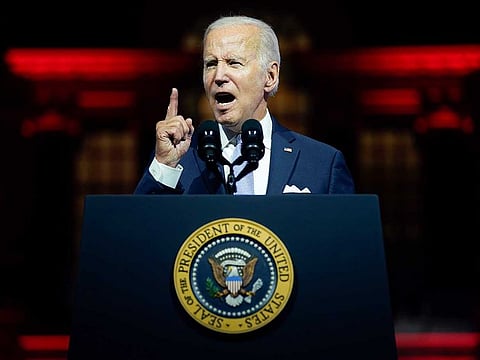Why America today is a house divided
Globally US continues to remain a big power whose sneeze can make other nations catch cold

Last week, American President Joe Biden took to the podium at Independence Hall in the city of Philadelphia, the birthplace of the Declaration of Independence and of American democracy itself, to deliver a televised speech in which he warned his fellow-Americans that their democratic system, and thus “the soul of the nation”, was under assault by demagogic forces “from within” bent on destroying its very foundation.
It was a dramatic clarion call to Americans unlike any other in their modern history, sounded in a speech that reportedly had been months in preparation, with noted historian Jon Meacham having lent a hand in its drafting, as he had done in the president’s earlier high-profile speeches.
How real is this putative threat and how true is the claim, echoed repeatedly by sundry analysts, that American democracy is teetering on the edge, hanging only by a thread.
The threat is real and the claim is credible -- which is indeed alarming. It is alarming because, though the leading role the US has played in the international order that it helped build at the conclusion of the first half of the 20th century is today in question, America remains globally engaged as a big power whose sneeze, as we say, can make other countries catch a cold.
In short, unlike Las Vegas, where what happens there stays there, what happens in America, will fan out in concentric circles of association that, like it or not, will in time, directly or indirectly, affect the lives of people everywhere around the world, much as had been the case of other big powers in history.
President Biden was right to emphasize in his speech that the threat to the democratic system came from “within”, a reference to the rightwing extremist movement propelled not just by Trumpist MAGA insurrectionists, such as those who stormed the US Capitol on that infamous day in January last year, but also, even more ominously, by demagogic lawmakers on the Hill still harboring delusions about a “stolen election”.
In their wildly acclaimed book, How Democracies Die, released by Harvard University Press in 2018, noted scholars Steven Levinsky and Daniel Zoblat share with their readers the eye-opening observation that the tragic paradox about democracy is that “its assassins use the very institutions of democracy itself -- gradually, subtly and legally -- to kill it”.
The book, a tour de force in comparative politics -- a field in political science that explores politics both within and between countries and traces its roots back to Aristotle and later to Machiavelli, Montesquieu and Max Webber -- delves partly into the rise of pro-fascist movements in Europe, the putative heartland of liberal democracy, in the 1930s, including that of national socialism in Germany, then challenges us to consider whether it could happen “here”, in the US of A. (You may or may not consider it significant that the Economist called How Democracies Die “[T]he most important book of the Trump era”.)
Historic levels of political polarization
Early in his speech, President Biden said: “Too much of what is happening in our country today is not normal”. Few Americans would disagree with that, for indeed too much of what is happening in American society in these times -- times when Americans find themselves dealing with historic levels of political polarisation -- is unquestionably abnormal.
Indeed, so abnormal are the times that they already represent no less than both a subversion of and a danger to what everyone proudly and a touch smugly used to call “the American way of life”, a way of life anchored in constitutional democracy as a political system and as a social ethos.
Just over a month ago, on the afternoon of August 4, the president met with a group of distinguished historians in the White House, where he engaged them in a 2-hour dialogue about the very subject he addressed in his speech last week.
And they shared with him the view that American democracy today faced a threat comparable to the one it had faced in the pre-civil war era, indeed even comparable to the one Europe faced by the emergence of pro-fascist movements on the continent before the outbreak of the Second World War.
In a nutshell, these are truly perilous times for democratic rule governance in America
That type of governance -- which in its burgeoning form in the early 19th century the French diplomat and political scientist Alexis de Tocqueville described in his seminal work, Democracy in America (1835), as being not only a political system but also an intellectual view of the world, a body of thought that defined the country’s culture and passions -- has eroded to the point where it now faces a clear existential threat.
Sounds unthinkable? Then consider the collective voice of roughly 100 scholars who came to that conclusion when they appeared on the website of the Washington-based think tank, New America, to debate the issue. The signatories included leading professors of political science, history and government who lectured at some of the nation’s most prominent universities.
The long and short of it is that the United States is today a house divided -- to be sure, not as divided as the South and the North were in 1861, though Heaven knows the Confederate flag was waved around with abandon inside the US Capitol on Jan.6 by insurrectionists intent on trashing the citadel of American democracy -- but divided nevertheless, divided to a point where the normalization of deeply toxic discourse among prominent figures, including lawmakers, is celebrated as de rigueur.
— Fawaz Turki is a journalist, lecturer and author based in Washington. He is the author of The Disinherited: Journal of a Palestinian Exile.


